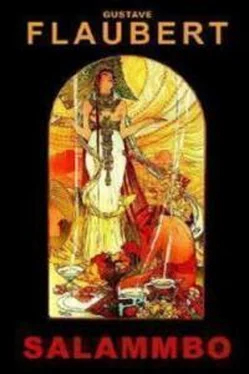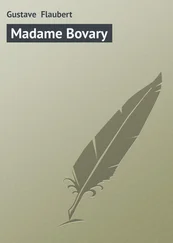But just now Salammbo felt no terror of him. The anguish which she used formerly to suffer had left her. A strange peacefulness possessed her. Her gaze was less wandering, and shone with limpid fire.
Meanwhile the python had become ill again; and as Salammbo, on the contrary, appeared to be recovering, old Taanach rejoiced in the conviction that by its decline it was taking away the languor of her mistress.
One morning she found it coiled up behind the bed of ox–hides, colder than marble, and with its head hidden by a heap of worms. Her cries brought Salammbo to the spot. She turned it over for a while with the tip of her sandal, and the slave was amazed at her insensibility.
Hamilcar's daughter no longer prolonged her fasts with so much fervour. She passed whole days on the top of her terrace, leaning her elbows against the balustrade, and amusing herself by looking out before her. The summits of the walls at the end of the town cut uneven zigzags upon the sky, and the lances of the sentries formed what was like a border of corn–ears throughout their length. Further away she could see the manoeuvres of the Barbarians between the towers; on days when the siege was interrupted she could even distinguish their occupations. They mended their weapons, greased their hair, and washed their bloodstained arms in the sea; the tents were closed; the beasts of burden were feeding; and in the distance the scythes of the chariots, which were all ranged in a semicircle, looked like a silver scimitar lying at the base of the mountains. Schahabarim's talk recurred to her memory. She was waiting for Narr' Havas, her betrothed. In spite of her hatred she would have liked to see Matho again. Of all the Carthaginians she was perhaps the only one who would have spoken to him without fear.
Her father often came into her room. He would sit down panting on the cushions, and gaze at her with an almost tender look, as if he found some rest from her fatigues in the sight of her. He sometimes questioned her about her journey to the camp of the Mercenaries. He even asked her whether any one had urged her to it; and with a shake of the head she answered, No,—so proud was Salammbo of having saved the zaimph.
But the Suffet always came back to Matho under pretence of making military inquiries. He could not understand how the hours which she had spent in the tent had been employed. Salammbo, in fact, said nothing about Gisco; for as words had an effective power in themselves, curses, if reported to any one, might be turned against him; and she was silent about her wish to assassinate, lest she should be blamed for not having yielded to it. She said that the schalischim appeared furious, that he had shouted a great deal, and that he had then fallen asleep. Salammbo told no more, through shame perhaps, or else because she was led by her extreme ingenuousness to attach but little importance to the soldier's kisses. Moreover, it all floated through her head in a melancholy and misty fashion, like the recollection of a depressing dream; and she would not have known in what way or in what words to express it.
One evening when they were thus face to face with each other, Taanach came in looking quite scared. An old man with a child was yonder in the courts, and wished to see the Suffet.
Hamilcar turned pale, and then quickly replied:
"Let him come up!"
Iddibal entered without prostrating himself. He held a young boy, covered with a goat's–hair cloak, by the hand, and at once raised the hood which screened his face.
"Here he is, Master! Take him!"
The Suffet and the slave went into a corner of the room.
The child remained in the centre standing upright, and with a gaze of attention rather than of astonishment he surveyed the ceiling, the furniture, the pearl necklaces trailing on the purple draperies, and the majestic maiden who was bending over towards him.
He was perhaps ten years old, and was not taller than a Roman sword. His curly hair shaded his swelling forehead. His eyeballs looked as if they were seeking for space. The nostrils of his delicate nose were broad and palpitating, and upon his whole person was displayed the indefinable splendour of those who are destined to great enterprises. When he had cast aside his extremely heavy cloak, he remained clad in a lynx skin, which was fastened about his waist, and he rested his little naked feet, which were all white with dust, resolutely upon the pavement. But he no doubt divined that important matters were under discussion, for he stood motionless, with one hand behind his back, his chin lowered, and a finger in his mouth.
At last Hamilcar attracted Salammbo with a sign and said to her in a low voice:
"You will keep him with you, you understand! No one, even though belonging to the house, must know of his existence!"
Then, behind the door, he again asked Iddibal whether he was quite sure that they had not been noticed.
"No!" said the slave, "the streets were empty."
As the war filled all the provinces he had feared for his master's son. Then, not knowing where to hide him, he had come along the coasts in a sloop, and for three days Iddibal had been tacking about in the gulf and watching the ramparts. At last, that evening, as the environs of Khamon seemed to be deserted, he had passed briskly through the channel and landed near the arsenal, the entrance to the harbour being free.
But soon the Barbarians posted an immense raft in front of it in order to prevent the Carthaginians from coming out. They were again rearing the wooden towers, and the terrace was rising at the same time.
Outside communications were cut off and an intolerable famine set in.
The besieged killed all the dogs, all the mules, all the asses, and then the fifteen elephants which the Suffet had brought back. The lions of the temple of Moloch had become ferocious, and the hierodules no longer durst approach them. They were fed at first with the wounded Barbarians; then they were thrown corpses that were still warm; they refused them, and they all died. People wandered in the twilight along the old enclosures, and gathered grass and flowers among the stones to boil them in wine, wine being cheaper than water. Others crept as far as the enemy's outposts, and entered the tents to steal food, and the stupefied Barbarians sometimes allowed them to return. At last a day arrived when the Ancients resolved to slaughter the horses of Eschmoun privately. They were holy animals whose manes were plaited by the pontiffs with gold ribbons, and whose existence denoted the motion of the sun—the idea of fire in its most exalted form. Their flesh was cut into equal portions and buried behind the altar. Then every evening the Ancients, alleging some act of devotion, would go up to the temple and regale themselves in secret, and each would take away a piece beneath his tunic for his children. In the deserted quarters remote from the walls, the inhabitants, whose misery was not so great, had barricaded themselves through fear of the rest.
The stones from the catapults, and the demolitions commanded for purposes of defence, had accumulated heaps of ruins in the middle of the streets. At the quietest times masses of people would suddenly rush along with shouts; and from the top of the Acropolis the conflagrations were like purple rags scattered upon the terraces and twisted by the wind.
The three great catapults did not stop in spite of all these works. Their ravages were extraordinary: thus a man's head rebounded from the pediment of the Syssitia; a woman who was being confined in the street of Kinisdo was crushed by a block of marble, and her child was carried with the bed as far as the crossways of Cinasyn, where the coverlet was found.
The most annoying were the bullets of the slingers. They fell upon the roofs, and in the gardens, and in the middle of the courts, while people were at table before a slender meal with their hearts big with sighs. These cruel projectiles bore engraved letters which stamped themselves upon the flesh;—and insults might be read on corpses such as "pig," "jackal," "vermin," and sometimes jests: "Catch it!" or "I have well deserved it!"
Читать дальше









![Гюстав Флобер - Закат Карфагена [Сборник]](/books/414440/gyustav-flober-zakat-karfagena-sbornik-thumb.webp)
